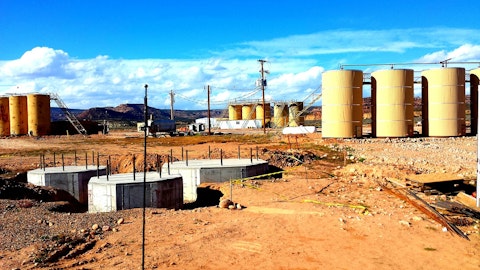I mean there’s all kinds of countervailing wins on that. But the interest rates, we’ve got a good banking group behind us. TCB is in there. There’s some big banks in there. They did a lot of due diligence on our projections and financials and they’re comfortable with our plans. And we have some nominal leverage requirements. We don’t ever in our projections see going above 3:1. In a downturn, we are typically protected by longer terms and the higher rates on that. So whether it’s — whether it’s debt you’re looking at or just the normal fluctuations in the business, those contracts help get you through those. And then if you ever have to do something on interest ratio. There are — presently, there are interest rate swaps that are fairly attractive and things like that, you can go from variable to fixed and vice versa, if need be.
So the interest rate thing, obviously, is something we watch. We haven’t watched it in 10 years, haven’t had to. But now with the CapEx we’re spending, we’ll generate a higher level of cash and EBITDA, and our projections look very good and strong and the banks agree with that. So, all those factors now, whether it’s commodity pricing or interest rates, we pretty well got a good handle on it and feel like we’re either naturally hedged or can get hedges in place if appears to be a problem. So long answer to a short question, I guess. But from the commodity prices and macro interest rate environment, we think we’re in pretty good shape.
Tate Sullivan: And just one follow-up question on the compressors that you are retiring, and you retire maybe it’s more of an accounting change when you choose to retire those units. But will there — could there be any residual value in the retired units at all? Or do they just simply go to scrap with no potential proceeds long term for you?
Steve Taylor: Yes. The ones we retired in Q4 were all smaller units pretty close to the end of their depreciable life and actually a useful a lot because when we look at the retirement, it’s not just book value we look at, but it’s the cost of overhaul something, rebuilding something back up to usual potential and then what’s your potential economic benefit from it, right? What’s your rent going to be? And so that drives those decisions, too. We were talking about $200,000 worth, which was actually about 150 or 200 units. So, it wasn’t much of a write-down for the number of units, but they’re primarily smaller, we got out of the fleet. We typically will — it’s like taking a kid to a candy store. We have these units scattered around.
We’ll have the field guys strip off any parts they can reuse and then if we don’t think we’re going to use them to refurbish or reapply, we’ll take them to scrap. But one example of reapplication is what we announced last year some electric motor conversion. We took some 250-horse class compressors took the engines of those. Actually, we built some of the industry reuse then put electric motors on them, and we’re building up some electric drive packages. So we squeeze whatever juice we can out of that lemon before we just sum the rest to the scrap yard.
Operator: Our next question comes from Justin Jacobs from Mill Road Capital. Please go ahead. Your line is open.




